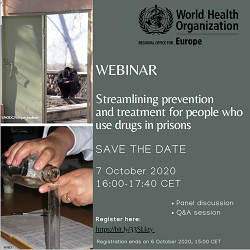Webinar: Streamlining prevention and treatment for people who use drugs in prisons

7 October 2020, 16:00-17:40 CET
The 2014 WHO report on Preventing overdose deaths in the criminal-justice system summarised the evidence around overdose -related deaths in prison and following release. Among other findings, it was shown that people who went through prison have a higher risk of overdose death than the general population, particularly in the first two weeks following release. Approaches to reduce harm recognize that many people who use drugs (PWUD) cannot totally abstain from using psychoactive substances in the short term, and therefore aim to help drug users not to start injecting drugs, to either stop or reduce injection frequency and to increase injection safety.
WHO has also developed a handbook on Prison health, where “Drug use and related consequences among prison populations in European countries” and “Drug treatment and harm reduction in prisons” were focused in two of its chapters, reiterating the interest of HIPP to progress in improving health conditions and services available in prisons for people who use drugs.
The primary purposes of the webinar was to:
- present the WHO vision on prison health in the context of universal health coverage and healthier populations and its alignment with the GPW13;
- discuss the International Guidelines on Human Rights and Drug Policy and focus the WHO perspective to work towards decriminalization of behaviours;
- present the World Drug Report 2020 and discuss alternatives to conviction or punishment and the currently existing services to treat and care for people with drug use disorders in contact with the criminal justice system;
- discuss the impact of COVID-19 on drug use in prisons and on service provision for drug use disorders;
- elaborate on the use of technology for remote provision and monitoring of substance use treatment for people in prison;
- raise awareness about possible alternatives to provision of services for PWUD by establishing partnerships that may contribute for greater accessibility to Harm Reduction programmes.



